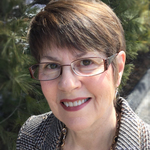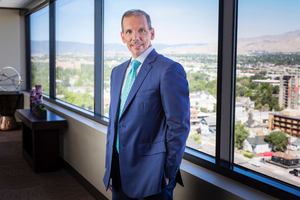View from the C-Suite with Dr. Tony Slonim, CEO of Renown Health
A vision for population health through community partnerships and innovation
// By Jane Weber Brubaker //
 Under Dr. Tony Slonim’s leadership, Renown Health has forged strong connections with the community, acting as a catalyst for change. “If you want to improve the health of your community, engage the people who are most likely to be affected in the conversation,” he says. “You want to change health care? Engage with the people whose lives you’re affecting. They have a vested interest in being part of the conversation.”
Under Dr. Tony Slonim’s leadership, Renown Health has forged strong connections with the community, acting as a catalyst for change. “If you want to improve the health of your community, engage the people who are most likely to be affected in the conversation,” he says. “You want to change health care? Engage with the people whose lives you’re affecting. They have a vested interest in being part of the conversation.”

Anthony Slonim, MD, DrPH, FACHE, CEO of Renown Health
When it comes to health, Nevada has its work cut out for it. “How do you go about helping people in a state that has historically been known for fun, entertainment, and addiction?” asks Anthony Slonim, MD, DrPH, FACHE, CEO of Renown Health in Reno.
Besides having a culture that encourages excesses, the state also has had its share of challenges related to an uncertain insurance marketplace that at times has threatened to leave many of its residents without any options.
In this environment, under Slonim’s leadership, Renown Health has consistently stepped up to meet the needs of the local community through innovative partnerships and programs.
For one of these programs, the Healthy Nevada Project, Renown has gained national recognition. But Slonim emphasizes that health care is local. “We’re here for our friends and neighbors, trying to make sure that we’re making a difference right here in northern Nevada for our community,” he says.
Recently, Renown Health announced its new strategic plan. We had the opportunity to discuss the key accomplishments of the last strategic plan and learn more about Slonim’s vision for the future of the organization, and the structural changes that will support it.
Renown Health has gained a national reputation for its large-scale genetics study, the Healthy Nevada Project, launched in 2016. The goal of the project is to improve the health of the entire population of Nevada. “What the Healthy Nevada project did was it took one of those things that ordinarily you would only get with a prescription and said to people, ‘Hey, you want a genetic test? Put your hand up, we’ll give you one for free,’” Slonim says. “So we took away that rate-limiting step, the doctor prescription, and we also took away the necessity for payment. And 40,000 people put their hands up.”
Many of the people who have participated are healthy individuals. The study is a way to engage them in a conversation about their health and provide them with useful insights. “I don’t care why they come or what the motivation is,” says Slonim. “My job is to meet them where they are along that spectrum of, hey, I just want to learn a little bit more about my family, or, I’ve got this problem I could really use help with, can you make a recommendation?”
Some of the people who take the test turn out to have medical issues that require treatment. “We made sure that we had the processes and systems in place where, if you were one of the few people who actually had something to worry about, we could get you to care,” says Slonim. So far, 127 women who tested positive for BRCA and are at risk for breast and ovarian cancer have been placed in care pathways. “Once you are managing the potential for a disease state, that’s when you’re in population health, in my opinion,” says Slonim. “For us, population health is how do we care for those people with a health condition and make sure we’re doing the best evidence-based care for them.”
Community Collaborations
A not-for-profit health system, Renown is committed to reinvesting in the community. One initiative Slonim has led for the past few years is the Truckee Meadows Healthy Communities project. This region includes Reno and surrounding areas. “The explicit goal is to make northern Nevada a healthy community by 2025,” Slonim says.
Organizations representing the broader community participate in the project — nonprofit agencies, human services agencies, business and economic development groups, faith communities, education, philanthropy, public health, and others. “Sometimes the best part of leadership is leading from behind,” Slonim says. “One of the most important ways that you can help is by being a convener. You can bring people to the table and find the people who are the most knowledgeable and help them lead.”
“Solving social determinants takes a community. It’s not only a hospital problem. It’s a community problem.”
Anthony Slonim, MD, DrPH, FACHE
CEO of Renown HealthHomelessness, for example, is the kind of problem Slonim believes a health system should not try to solve on its own. “We have a terrible crisis with homelessness in our community,” he says. “Obviously, we have a vested interest in making sure people who are homeless get cared for, and at the same time, we may not be the best people to lead out on solving the problem. Solving social determinants takes a community. It’s not only a hospital problem. It’s a community problem.”
Stepping Up When It Counts
Renown Health has demonstrated its commitment to Nevadans in tangible ways, proactively bridging the gaps when needed. One example is its work to ensure statewide coverage when health insurers began to withdraw from the Obamacare exchanges, leaving some individuals without a plan they could participate in. In early 2017, 14 counties out of 17 were without a health exchange plan – leaving 8,000 Nevadans high and dry.
“The governor was taking a lot of heat nationally because at one point we were the only state that still had bare regions,” says Slonim. “We put our hands up and said, ‘Wait a minute. This is not a Third World country here — it’s Nevada. How can we work together to make sure there are no bare counties in Nevada?’”
Renown Health became part of the solution. When Centene came on board with its Silver Summit plan to cover residents in the 14 bare counties, Renown agreed to lease its own Hometown Health plan’s provider network to expedite the process.
Recently, Renown successfully concluded a contract negotiation with Anthem Blue Cross, the area’s most popular insurer, inking an 11th-hour agreement that enabled members to continue in-network coverage with no disruptions. “As doctors, nurses, and caregivers, we want to ensure the greatest access, experience, and highest-quality care for every member of our community, including those insured by Anthem,” Slonim said in an August press release.
Health and Health Care
One of Renown’s key initiatives has been to advance the conversation around health and health care. “Changing the health of a region is not easy,” Slonim admits. “For all of us who have been focused on social determinants and literacy and other things, it’s nice to talk about from the C-Suite, but on the operational level where work really gets done, this is tough stuff.”
To begin to solve for the health side of the equation, Renown created a new structure, consisting of two operating divisions: Health and Health Care. The rationale is that dedicated resources in each division will be empowered to focus on specific issues.
Slonim illustrates with this example:
“We have a problem with childhood immunizations in the community. I could give that all day long to the people running the children’s hospital and they will never get to the problem. It’s not because they don’t believe it’s important. It’s because they’re busy trying to staff the emergency room from midnight to 7 a.m. And so, what I realized is we need a different structure to take care of that problem.”
The Health division comprises four institutes:
- Child Health Institute
- Behavioral Health and Addiction Institute
- Healthy Aging Institute
- Institute for Health Innovation (Healthy Nevada is part of this institute)
To staff the new institutes, Renown has been looking outside the normal channels. “We find ourselves hiring people who know how to manage tens and hundreds of thousands of lives. They have a different lens into the problems,” Slonim says, adding, “It’s no surprise that three of the institutes are focused on priority populations for people with Medicaid: seniors, behavioral health and addiction, and kids.”
“You want to change health care? Engage with the people whose lives you’re affecting. They have a vested interest in being part of the conversation.”
Anthony Slonim, MD, DrPH, FACHE
CEO of Renown Health“We’ve invested heavily in those institutes over the past five years to make sure that people have what they need to live healthier,” says Slonim. His hope is that, through dedicated resources and strong partnerships with stakeholders in the community, improvements in the region’s biggest health challenges will be accelerated.
“If you want to improve the health of your community, engage the people who are most likely to be affected in the conversation,” he says. “You want to change health care? Engage with the people whose lives you’re affecting. They have a vested interest in being part of the conversation.”
Jane Weber Brubaker is executive editor of Plain-English Health Care, a division of Plain-English Media. She directs editorial content for eHealthcare Strategy & Trends and Strategic Health Care Marketing, and is past chair of the eHealthcare Leadership Awards. Email her at jane@plainenglishmedia.com.
